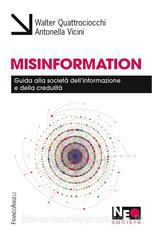 Invece di mettere insieme i punti di vista per arrivare a una rappresentazione comune della realtà, viviamo in un multiverso di realtà distinte e separate in base ai diversi punti di vista e sistemi di opinioni. Un pezzo di ieri sul New York Times in proposito va letto. Vi si citano le osservazioni empiriche di Quattrociocchi sulle eco-chamber, non mancano gli studi contrastanti, ma soprattutto si va notare la perdita di importanza delle prove documentali:
Invece di mettere insieme i punti di vista per arrivare a una rappresentazione comune della realtà, viviamo in un multiverso di realtà distinte e separate in base ai diversi punti di vista e sistemi di opinioni. Un pezzo di ieri sul New York Times in proposito va letto. Vi si citano le osservazioni empiriche di Quattrociocchi sulle eco-chamber, non mancano gli studi contrastanti, ma soprattutto si va notare la perdita di importanza delle prove documentali:
Documentary proof seems to have lost its power. If the Kennedy conspiracies were rooted in an absence of documentary evidence, the 9/11 theories benefited from a surfeit of it. So many pictures from 9/11 flooded the internet, often without much context about what was being shown, that conspiracy theorists could pick and choose among them to show off exactly the narrative they preferred. There is also the looming specter of Photoshop: Now, because any digital image can be doctored, people can freely dismiss any bit of inconvenient documentary evidence as having been somehow altered.
This gets to the deeper problem: We all tend to filter documentary evidence through our own biases. Researchers have shown that two people with differing points of view can look at the same picture, video or document and come away with strikingly different ideas about what it shows.
La disinformazione e la pura falsità partigiana diventa normale. Sicché ripulire la mente dall’inquinamento delle notizie sbagliate richiede sempre più disciplina e pazienza collettiva.
Vedi:
How the Internet Is Loosening Our Grip on the Truth
Facts and cats. For State of the net 2016




Commenta